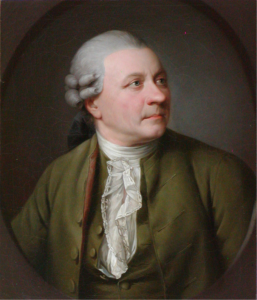The beloved's fear - To Cidli
(Poet's title: Furcht der Geliebten - An Cidli)
Set by Schubert:
D 285
[September 12, 1815]
Cidli, du weinest, und ich schlummre sicher,
Wo im Sande der Weg verzogen fortschleicht,
Auch wenn stille Nacht ihn umschattend decket,
Schlummr’ ich ihn sicher.
Wo er sich endet, wo ein Strom das Meer wird,
Gleit ich über den Strom, der sanfter aufschwillt,
Denn, der mich begleitet, der Gott gebot’s ihm:
Weine nicht, Cidli.
Cidli, you are crying, and I am sound asleep,
Where the path goes off and disappears in the sand;
Even when it is hidden in covering shade in the quiet night
I shall sleep safely on that path.
Where it comes to an end, where a stream becomes the sea,
I shall glide over that stream, swelling gently;
For the one who is accompanying me is God, who directs it.
Do not cry, Cidli.
All translations into English that appear on this website, unless otherwise stated, are by Malcolm Wren. You are free to use them on condition that you acknowledge Malcolm Wren as the translator and schubertsong.uk as the source. Unless otherwise stated, the comments and essays that appear after the texts and translations are by Malcolm Wren and are © Copyright.
☙
Themes and images in this text:
Covers and covering Flying, soaring and gliding Leading and directing Night and the moon Noise and silence Paths Rivers (Strom) Sand The sea Sleep Tears and crying
Klopstock uses a number of conventional metaphors in these two short stanzas of reassurance to a grieving lover: sleep is death; death is a sleep; life is a path; the path of life is sometimes uncertain and hidden in (emotional and spiritual) darkness; night is death; silence is death; life is a river; the sea is eternity; dying is crossing a river. What is less conventional is the voice itself (it is the person who is dying who is saying ‘do not cry, he is at peace now’) and the combinations of the metaphors, lifting the ideas beyond cliche.
Sleeping soundly at the point where the path is lost in the sands is a strange image, but it manages to convey the sense of semi-consciousness that we associate with sleeping and dreaming, and the reference to ‘sand’ evokes the sands of time and the emptying of the hour-glass (as well as some uncertainty about where the path is leading). At the river’s mouth the speaker does not simply merge into the sea (in the standard image of the river of life taking us to the sea of heaven) but he ‘glides over’ or ‘across’ the swelling river, as if released from the basic physical laws that rivers and humans have to obey. Accompanied by the director of these laws, he is confident that he will transcend them.
There is always a sense that the goal is slightly unclear. The path is covered or disappears in the sand. There is no single point where the river has become the sea (it is still ‘swelling’). Nor do we need to be particularly far along the path or very far downstream to experience these uncertainties. In Klopstock’s world, with its much shorter life expectancy, the paths and the rivers could be very short, murky or turbulent indeed. For us, the journey from life to death through various stages of infirmity or dementia can be extremely slow and twisting, but just as uncertain. Can we sleep ‘soundly’ in such conditions?
☙
Original Spelling Furcht der Geliebten - An Cidli Cidli, du weinest, und ich schlummre sicher, Wo im Sande der Weg verzogen fortschleicht; Auch wenn stille Nacht ihn umschattend decket, Schlummr' ich ihn sicher. Wo er sich endet, wo ein Strom das Meer wird, Gleit' ich über den Strom, der sanfter aufschwillt; Denn, der mich begleitet, der Gott gebots ihm! Weine nicht, Cidli.
Confirmed by Peter Rastl with Klopstocks Oden. Erster Band. Leipzig bey Georg Joachim Göschen. 1798, page 131; and with Oden von Klopstock. WIEN, gedruckt bey Joh. Thomas Edlen von Trattnern, k.k. Hofdruckern und Buchhändlern. 1784, page 163.
To see an early edition of the text, go to page 131 [149 von 356] here: http://digital.onb.ac.at/OnbViewer/viewer.faces?doc=ABO_%2BZ223304809


